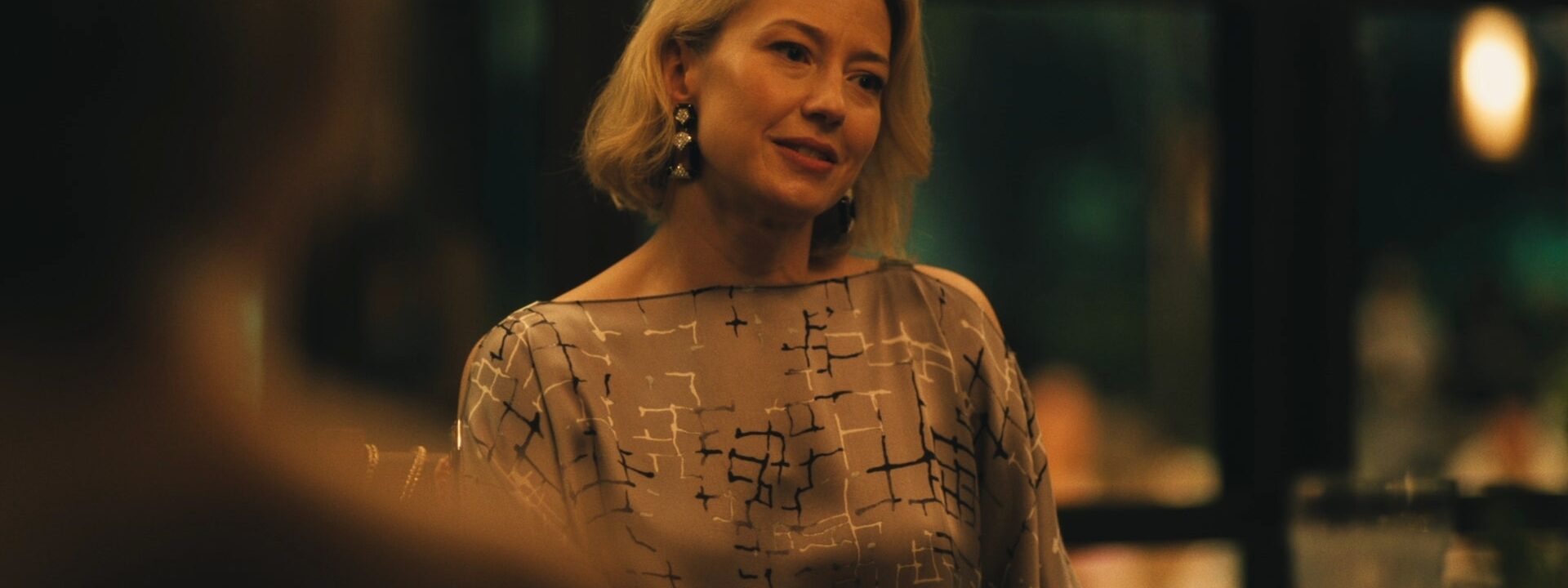We tuned in to find out who died, but the moment in The White Lotus finale that truly hit hard was Laurie’s monologue about the complexity of female friendship. After a season of passive-aggressive tension, the trio of women we loved to judge sat down for their final dinner, where two of them pretended the week had been perfect. Jaclyn (played brilliantly by Michelle Monaghan), the self-satisfied actress, compared the strained trip to “floating on a cloud,” while Kate (Leslie Bibb’s Trump-supporting Texan socialite) smugly declared her metaphorical “garden is in bloom.” But Laurie—my new favorite character, thanks to Carrie Coon’s raw performance—wasn’t buying it.
A divorced lawyer who struggles with contentment, Laurie cut through the facade. “That’s funny, ’cause if I’m being honest, all week I’ve been so sad,” she admitted, her voice trembling. “I just feel like my expectations were too high… or like, as you get older, you have to justify your life, you know? Your choices. And when I’m with you guys, it’s so obvious what my choices were—and my mistakes.”
I expected Laurie to lash out, to call her friends out for being fake. Instead, she was devastatingly honest in a different way. She confessed she had no real belief system, that society’s milestones—marriage, motherhood, career success—hadn’t brought her fulfillment. Yet in Thailand, a place steeped in spirituality, she realized something: time itself, including her decades-long friendship with Jaclyn and Kate, was what gave her life meaning.
“We started this life together,” she said, breaking down. “We’re going through it apart, but we’re still together. And when I look at you guys, it feels meaningful. I can’t explain it, but even when we’re just sitting around the pool talking about stupid shit, it still feels… fucking deep.” After praising Jaclyn’s “beautiful face” and Kate’s “beautiful life”—the things that matter most to each of them—she delivered the knockout line: “I’m just happy to be at the table.”
My husband didn’t get it (apparently, many didn’t), but I teared up. By the next morning, my group chats were flooded with friends dissecting Laurie’s speech—more than any dramatic plot twist. One friend pointed out that not since America Ferrera’s Barbie monologue had an onscreen moment resonated so deeply with women.
Laurie’s words wrecked us because they articulated unspoken truths about female friendship. Yes, your oldest friends see through you—sometimes reflecting a version of yourself you’ve outgrown. But there’s also something profound about sitting with them, speaking in your shared shorthand, marveling at how they’ve both changed and stayed exactly the same. Last year, I reunited with two college friends after years apart and was struck by how they’d grown into the confident women they were always meant to be. Just being near them felt like a gift.
Sure, Jaclyn, Kate, and Laurie bickered all season, but the real twist was how The White Lotus redeemed them. Creator Mike White called me out: I’d spent the season judging their shallow conversations and resort-ready outfits. But Laurie grounded them. Without saying it outright, she made the case that female friendship—messy, enduring, and deeply meaningful—is its own kind of salvation.Friendships can be messy, and maybe that’s okay—as long as love is at their core. As one of my closest friends texted me last night, long-term female friendships go beyond petty fights or awkward phases. They’re deeper and more enduring, even when, like most relationships, they’re imperfect and complicated.
When Laurie speaks her truth at dinner in The White Lotus, the show captures something painfully familiar: a group of women sitting around a table, presenting the most polished, flawless versions of their lives. Their adoring partners, always saying the right thing; their impossibly brilliant, athletic children, untouched by the chaos of the internet. Even as grown women—even with therapy, wisdom, or life experience—the urge to brag, to “justify your life” as Laurie says, can feel instinctive. That pull is especially strong when you feel as lost and left out as Laurie did all season.
It takes courage to break away from the group, but what moved me most about her monologue was watching her shift the conversation toward something real. At 43, this is what true friendship means to me now: the ability to be vulnerable, to drop the act of perfection, and to simply be ourselves—even when we’re sad, vain, ridiculous, or politically at odds (as uncomfortable as that last one can be). It’s about being happy just to be together at the table.
The “Bragging Table” has always left me cold, but strangely, the arc of these three friends made me see it with more empathy. Watching these prestige-TV characters, I found myself wondering about the deeply human reasons—insecurity, pain?—that might drive women to perform for each other. And I felt hopeful, thinking about how friendships can and do evolve.
By the final dinner, Laurie changes everything by speaking her truth. Jaclyn and Kate soften, tears are shed, “I love yous” are exchanged, and the fractured trio finally comes together on the couch, laughing with pure joy. My takeaway? We should all be a little more like Laurie.
